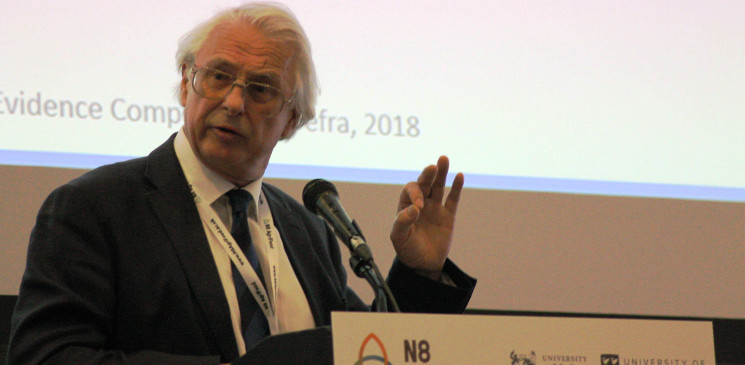
A RENOWNED academic and veterinary surgeon has warned that the implications of Brexit on the nation’s food production are “major” and include the potential diminution of the workforce required to take food from farm to fork.
In his keynote address at the N8 AgriFood International Conference 2018: ‘People, Health and Food Systems, challenges and solutions for 2030’, in Liverpool, Professor The Lord Trees, crossbench member of the House of Lords said that future food security was “a major responsibility of government” and it needed to ensure that affordable food, produced to high standards is maintained after the UK leaves the European Union.
Lord Trees, former Head of the Parasite and Vector Biology Division at the Liverpool School of Tropical Medicine and former Dean of the Faculty of Veterinary Science, University of Liverpool, told around 300 delegates at the annual gathering of some of the world’s leading experts in Agri-food and tech: “Whilst supporting environmental improvement, Government needs to ensure that we continue to produce adequate amounts of food of good quality in an environmentally sustainable way at affordable prices.”
This could be in jeopardy, he argued, partly because of the numbers of foreign workers currently employed across the nation’s food production system: “We are hugely reliant on non-UK EU nationals in various large areas of our economy, particularly in agri-food.
“In terms of my own particular area, in contribution to veterinary activities, but also in terms of labour at all levels in the food chain, particularly the slaughter and food processing stages, in harvesting of crops, vegetables and fruits and so on.
“There are huge implications and the worry is that Brexit is making it less likely that people will want to come, those who are here may want to leave and we will have a labour deficit that will be difficult to cover, certainly without immigration of some sort.”
He added: “This then becomes the responsibility of the Home Office, not DEFRA, (the Department for Environment, Food & Rural Affairs) and there needs to be a realistic approach to admittance of overseas labour, there has to be an acknowledgment that we absolutely need these people for our economic development.
“The criteria, as well, need to be realistic. It’s no good saying that of course we are going to allow the brain surgeons, the financial whizzkids in – we need more than just them. I’m sorry, but we need people to do the job on the ground, highly-skilled, manually proficient people who are willing to work hard and harvest our food and process our livestock products.”
The annual conference is organised by the N8 AgriFood Programme, part of the N8 Research Partnership, which aims to maximise the impact of research expertise from the eight most research intensive universities in the North of England: Durham, Lancaster, Leeds, Liverpool, Manchester, Newcastle, Sheffield and York. Its purpose is to promote collaboration, establish innovative research capabilities and drive economic growth.
Hosted, this year, by the Universities of Liverpool and York, the N8 AgriFood conference has attracted leading academics and industry experts and representatives from across the global agrifood sector to address the key issues facing the food system, forge new partnerships and showcase innovation.
In his speech, Lord Trees referred frequently to the Department for Environment, Food and Rural Affairs recent closed consultation, Health and Harmony: the future for food, farming and the environment in a Green Brexit and acknowledged the document states the same cash funding will remain until the end of the current parliament; a major emphasis on the environment; public money for public good; and a conspicuous emphasis on animal health and welfare.
But he told delegates that the headline implication of Brexit on the sector will be the potential loss of European funding through the Common Agricultural Policy, which will be replaced initially by domestic public support. “How that will change in both quantum and qualitative nature,” he said, “is a matter of current debate.”
Therefore the N8 AgriFood conference, he said, was extremely timely: “Agri-food is the biggest manufacturing industry in the UK economy and it will continue to be huge and it is probably the sector most impacted by Brexit in terms of legislation. DEFRA probably has the biggest legislative load to cope with in terms of bringing EU law into UK law and then revising and adapting it for our particular purposes in the coming years.
“There’s a huge legacy of law around energy, environment, farming, so this is very timely and this is a big challenge to the UK economy going forward.”
Participating organisations in this year’s conference include: The Real Junk Food Project, Farm Urban, DEFRA, The Trussell Group, Mathys-Squire, Pepsico, Waitrose, Co-op, William Jackson Food Group, Samworth Brothers, WRAP, Mondelez, Nestle, First Love Foundations, Can Cook Kitchen, the Environmental Change Institute, The Food Domain, the Food Standards Agency, SIME-Darby PLC, Decarbonize Ltd, Living Loud, IFSTAL, Innovate UK and the British Geological Society.
N8 AgriFood International Conference 2018: ‘People, Health and Food Systems, challenges and solutions for 2030’ took place over two days (June 13 & 14) at the Hilton Hotel in Liverpool.